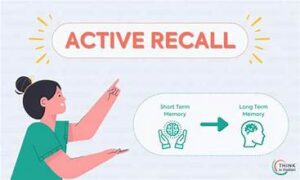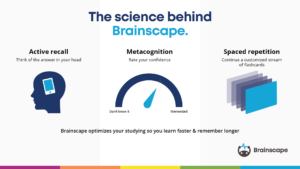
Active recall techniques are powerful tools that can significantly enhance your learning efficiency and retention of information. Unlike passive review methods, active recall requires actively retrieving information from memory, which has been shown to strengthen neural connections and improve long-term learning outcomes. Here’s a comprehensive guide to understanding and implementing active recall techniques in your study routine:
What is Active Recall?
Active recall involves actively retrieving information from memory rather than simply re-reading or reviewing materials passively. This technique challenges your brain to recall information without external cues, which enhances memory consolidation and retrieval strength.
How Does Active Recall Work?
- Self-Testing: Engage in self-testing by covering up your notes and attempting to recall key concepts, definitions, or facts from memory. This process forces your brain to retrieve information, reinforcing neural pathways associated with learning.
- Flashcards: Use flashcards to create concise questions or prompts on one side and corresponding answers or information on the other. Quiz yourself regularly using flashcards to reinforce learning and identify areas that require further review.
- Summarization: After studying a topic, summarize the key points or concepts in your own words. This active process helps reinforce understanding and aids in retaining information for longer periods.
Benefits of Active Recall Techniques
- Improved Retention: Active recall strengthens memory retention by promoting deeper encoding of information and reinforcing neural connections associated with learning.
- Enhanced Understanding: By actively retrieving information, you gain a clearer understanding of complex topics and identify gaps in your knowledge that require additional study.
- Efficient Learning: Active recall techniques optimize study time by focusing on effective learning strategies that prioritize comprehension and long-term retention over passive review methods.
Tips for Implementing Active Recall
- Start Early: Begin using active recall techniques early in your study process to maximize their effectiveness. Regular practice will strengthen memory recall and improve overall learning outcomes.
- Mix It Up: Incorporate a variety of active recall methods, such as self-testing, flashcards, and summarization, to keep your study sessions engaging and effective.
- Consistency is Key: Schedule regular study sessions that include active recall practice to maintain continuity and reinforce learning over time.
Conclusion
Active recall techniques offer a proactive approach to learning that enhances memory retention, improves understanding, and optimizes study efficiency. By actively engaging in self-testing, using flashcards, and summarizing key information, students can transform their study habits and achieve better academic results. Embrace active recall as a fundamental strategy in your study routine to foster deep learning and mastery of subjects, ultimately empowering you to excel in your educational pursuits. Incorporating these techniques not only boosts learning efficiency but also cultivates lifelong learning skills that extend beyond the classroom.




